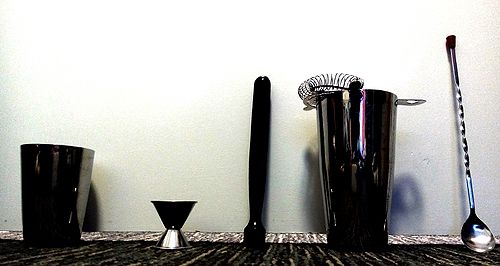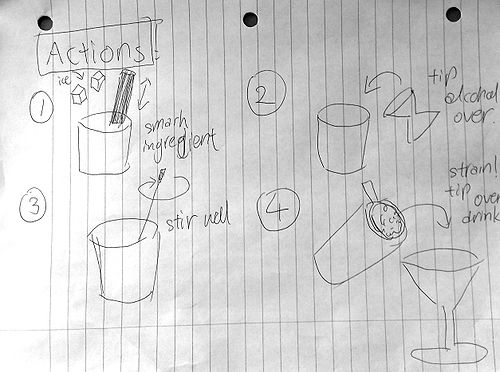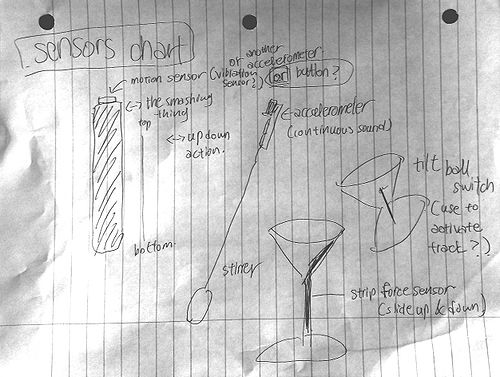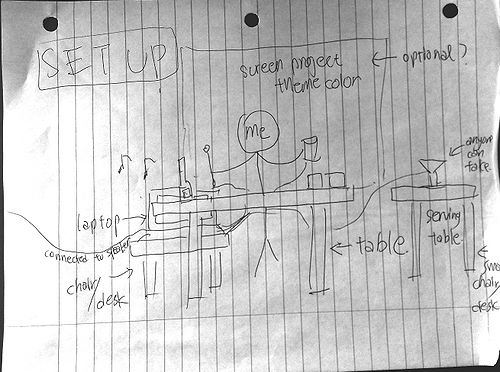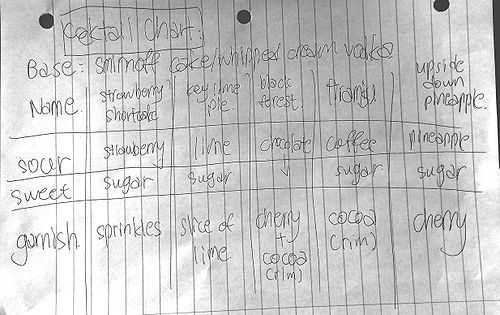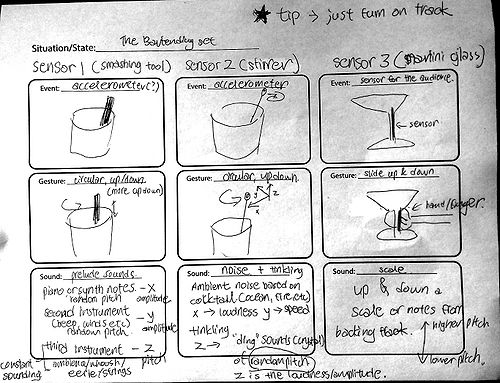Musicatini
Appearance
Overview
Musicatini is a set of cocktails that include interaction and sound in its recipe. Each cocktail is an experience that requires all 5 senses to enjoy. The performance starts when the cocktail is being made, and ends when an audience member finishes drinking the 'interactive' cocktail.
Drawings
The tools
Actions involved when mixing
Sensor to tool mapping
Stage set-up
Cocktail design chart
Sound design chart
Cocktails
Actual Cocktail Designs
- Wines
- Flavored Vodkas
- Canned Fruits
- Simple Syrup
- Citrus Fruits
- Mint
Original Cocktail Designs
- Strawberry Shortcake
- Recipe: Vodka + Strawberry + Sugar + Sprinkles
- Backing Track Inspiration: Invader Invader - Kyary Pamyu Pamyu
- Sound Design Theme: Sweet, cute, rainbow
- Key Lime Pie
- Recipe: Vodka + Lime + Sugar + Slice of Lime
- Backing Track Inspiration: Circle Game - Joni Mitchell
- Sound Design Theme: Plain, peaceful, happy
- Black Forest
- Recipe: Vodka + Chocolate + Cherry + Cocoa (powder)
- Backing Track Inspiration: Una Mattina - Ludovico Einaudi
- Sound Design: Dark, sweet, saccharine
- Tiramisu
- Recipe: Vodka + Coffee + Sugar + Cocoa (powder)
- Backing Track Inspiration: Caffeine - Yoseob
- Sound Design: Bittersweet, sophisticated
- Upside Down Pineapple
- Recipe: Vodka + Pineapple + Sugar + Cherry
- Backing Track Inspiration: Hawaiian Rollercoaster Ride
- Sound Design: Hawaiian, beach, upbeat
3 Lists
Things you need to have done for a minimal viable product
- Each cocktail: the drink + background track + motion/sounds
Things that you want to have done by the final deadline
- Fine tune program so that sounds produced are coherent and nice
- Target 5 cocktails
Things that would be nice to have if you had unlimited time.
- Design more cocktails
List of Materials
- Sensors
- Accelerometer
- Strip sensor
- Tilt ball switch
- Alcohol and other ingredients, cups
- Electronic parts connecting sensor/clips to computer
- Bartending Kit
- Arduino + Laptop
- Background track (part of sound design)
Scheule/Progress
Planned Schedule
- (11/10): order LED ice cubes/cups, map sensor to tool
- (11/13): design the drinks (recipe + background + desired motion/sound)
- (11/16~11/26): sound design, practice, prototype tools
- (11/30): prepare ingredients, rehearse
- (12/1): dress rehearsal
- (12/3): final presentation
- (12/4): documentation
Similar Examples
Uses accelerometer to measure tilt angle.
The Grip Maestro is similar - uses an existing object + sensors
Uses a lot of small objects for interaction
